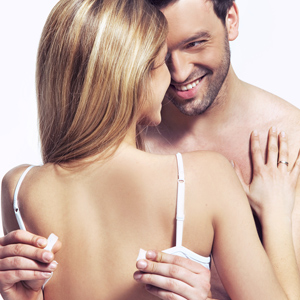
For all our supposedly superior rationality, guys believe in a whole lot of rubbish and balderdash, either by choice or because we just don’t know any better. Well, it’s time to expose some of our more fantastic ideas for what they are: humbug!
1. Looking at boobs is healthy for you
This is the one most heterosexual men would like to cling to forever. Grandfathers pass it down to their sons and grandsons: the secret to a long and healthy life is to ogle at women’s cleavage on a regular basis.
Last year, all of our hopes were confirmed when a study by German researchers, led by gerontologist Dr Karen Weatherby, scientifically confirmed that staring at women’s breasts is almost as healthy as an intense regular exercise regime and can prolong a man’s lifespan by up to five years.
The 5-year study involving 200 healthy men showed that those who gazed at boobs regularly, exhibited slower resting pulse rates, lower blood pressure and fewer episodes of coronary artery disease. “Sexual excitement gets the heart pumping and improves blood circulation,” said Weatherby. “Our study indicates that engaging in this activity a few minutes daily cuts the risk of stroke and heart attack in half.”
Alas, the whole thing turned out to be an elaborate hoax. There was no such study and there is no indication whatsoever that obsessively eyeballing boobies has any health benefits whatsoever. There’s a word for the unsolicited ogling of the anatomy of unsuspecting bystanders though: objectification. And that’s neither cool nor healthy!
2. “Hair of the dog” is a cure for hangovers
If you wake up with a hangover in the morning, some more of what caused it will fix you up in no time, right?! Millions of men swear by this “hair of the dog” method, but guess what – it doesn’t work!
A recent study (a genuine one, not a hoax this time) by a team of neuroscientists from the University of Southampton suggests that common booze withdrawal symptoms can indeed be relieved by administering small doses of alcohol. But their work, which was carried out on tiny worms which exhibit behaviour remarkably similar to that of humans, also indicates that this approach is likely to lead to increased alcohol dependency in the long run.
Alcohol is what caused your headache to start with. So unless your plan is simply to remain drunk indefinitely, drinking more on the morning after will merely postpone your hangover.
3. Regular shaving causes coarser, darker and thicker beard re-growth
Since hair is thicker at the base then at the tip, stubble may initially feel a little coarser and thicker soon after a shave and since it’s not been exposed to a lot of sun yet, it may look a bit darker, but shaving doesn’t affect hair growth at all. It will grow back at the same speed and with the same thickness and density as always, no mater how often you shave.
And while we’re on hair myths, hair loss doesn’t just come from your mother’s side of the family. It’s genetic and can come from either the maternal or the paternal side.
4. Single guys have more sex
This is the one that aging wannabe playboy bachelors tell themselves. Alas there is overwhelming evidence that men who are married or in a relationship get more nookie than their single buddies.
A 2006 study published in the British medical journal The Lancet, which analysed data from 59 countries gathered over a period of 10 years found that married people engage in sexual activity more frequently than singles. In the same year a survey by the US National Opinion Research Centre revealed that married men have sex between 28 and 400% more often than bachelors and that husbands give and receive more oral sex than single guys.
5. Breaking the seal
We’ve all succumbed to this particular myth at some stage. The idea is that there is a point in time during a prolonged stint of boozing – at a party, say – when you take your first slash and that after you’ve broken that “seal” you have to run to the urinals every ten minutes from then onwards. Well, rest assured, there is no such magical seal, just a sensible scientific explanation.
Drinking raises your blood alcohol level. Alcohol in the blood suppresses the production of a hormone in your brain called anti-diuretic hormone (ADH), which helps your body retain water and controls urine production. Once you’ve drunk enough booze to fill your bladder to capacity you need to pee, but since your blood alcohol levels are high and your ADH levels low, your body continues to generate more urine instead of retaining the water and you have to head off to the little boys’ room regularly.
6. Men think about sex every seven seconds
This is an entirely manufactured statistic propagated by the seriously oversexed among us. It’s a difficult assumption to study rigorously, but it’s certainly greatly exaggerated.
According to the Kinsey Institute, while some men fantasise about sex many times a day, 54% of us do it at least once a day, 43% a few times a week or month and 4% only once a month or less.
??????????(Andrew Luyt, Health24, September 2010)
(Picture: lovers from Shutterstock)




 Publications
Publications
 Partners
Partners













